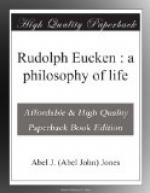This eternal truth persisting through a variety of temporary and more or less correct expressions of it is to be observed in a marked manner in the moral ideas of mankind. What a variety of ethical doctrines have been expounded and believed, yet how striking the similarity that becomes apparent when they are further examined! In practice, the standard of morality has often been based on mere utility, but it has taken a higher and more absolute basis in the mind of man. Ideas concerning morality have generally been nobler than can be accounted for by environment, and by the subjective life of the individual. Why this ultimate consistency in the moral aspirations of the ages, why a categorical imperative, and why does conscience exist in the human being?—these facts cannot be accounted for if there is no deeper basis for life than the life of humanity at any definite period of time.
The unchangeable laws of logic, too, are instances of the eternal truth. The principles of the validity of thought are entirely independent of individuals, of the passage of time, and of the environment of man. “Our thought cannot advance in the definite work of building up science without producing and employing a definite logical structure, with fixed principles; these principles are immanent in the work of thought, they are above all the caprice and all the differences of the individuals.” Whence again this consistency in a changeable and subjective world?
The marvellous influence that ideas have exerted upon man again points to the persistence and power of the eternal. Is it not strange how it is that man often serves but as a mere instrument for the realisation of an idea, and how he is often carried away by an idea to do things which are against his own personal interests and desires? And when he and his generation have passed beyond human sight, we often find a new generation direct their endeavours in the same way, and we wonder what is behind such a continuity in the struggles of mankind.
The history of great personalities in the realms of literature, art, and science show in a remarkable way how men have risen above the influences of their time, and beyond the cramping tiredness of the mere flesh. Could a great thinker like Aristotle be entirely conditioned by flesh and environment? And what of the great artists and poets who have conquered the chains of mortal finitude and breathed of higher worlds? Every one of them is a convincing testimony of the possibility of mankind transcending the material, and taking unto itself of the resources of a deeper world.
Then the dissatisfaction of the ages with their limited knowledge of truth cannot but tell of a great eternal something that stirs at the basis of the human soul. The people of to-day find the various systems of the day inadequate; they search for something higher, and the mere fact that they search beyond matter and the mere subjective human qualities is in itself a testimony to the existence of a world higher than the material and subjective.




